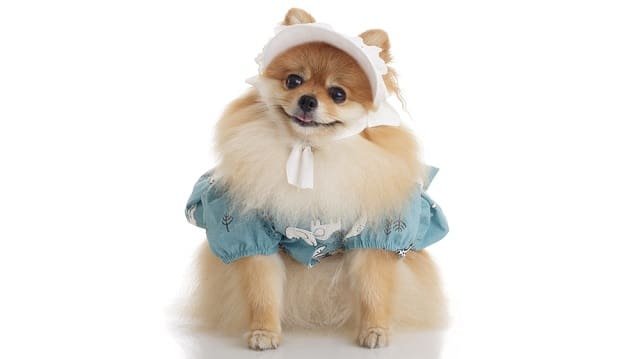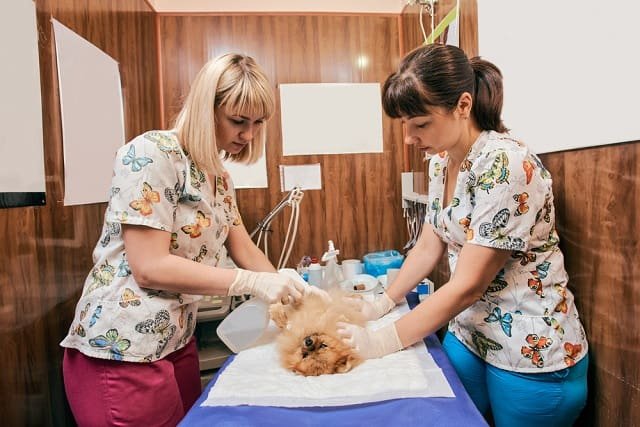Table of Contents
Welcoming a new life into your Pomeranian’s furry family can be an exciting but daunting experience. Ensuring the health of your pregnant pomeranian requires special attention and care. This guide will provide essential tips and advice for caring for your pregnant Pomeranian.
From the early stages of pregnancy to whelping and postpartum care, our comprehensive guide covers everything you need to know. We’ll discuss proper nutrition, exercise routines, grooming techniques, and potential health issues to watch out for. We aim to empower you with the knowledge and tools to keep your pregnant Pomeranian safe and comfortable throughout her journey to motherhood.
Whether you have a first-time mom or an experienced breeder, our guide is designed to provide valuable information for all Pomeranian owners. By implementing our expert advice, you can ensure a smooth and stress-free pregnancy for your beloved pet. Prepare to begin this beautiful journey of nurturing and caring for your pregnant Pomeranian confidently and efficiently.
Understanding The Needs Of a Pregnant Pomeranian
Caring for a pregnant Pomeranian starts with understanding her unique needs during this particular time. As a responsible pet owner, it’s crucial to be aware of the changes her body will undergo and the care required to support her throughout the pregnancy.
During pregnancy, your Pomeranian’s body will experience hormonal changes that prepare her for motherhood. Providing her with a calm and stress-free environment ensures her well-being. Avoid any unnecessary excitement or loud noises that may cause her undue stress.
Pregnant Pomeranians may also experience behavioral changes. They may become more affectionate, protective, or even a little moody. Be patient and understanding during this time, as these changes are regular and temporary. Watch for any discomfort or distress, and consult your veterinarian if necessary.
Understanding the needs of your pregnant Pomeranian is the first step to ensuring her well-being. You can provide her with the proper knowledge and care and a safe and comfortable environment throughout her pregnancy.

Preparing Your Home For a Pregnant Pomeranian
Creating a safe and comfortable space for your pregnant Pomeranian is essential for her well-being. Before her due date, it’s important to make adjustments around your home to accommodate her changing needs.
Start by designating a quiet, cozy area where your Pomeranian can rest and relax. This space should be away from any loud noises or high-traffic areas. Consider using a whelping box, which provides a secure and comfortable space for your
Pomeranian to give birth and care for her puppies.
Ensure that the whelping box is large enough to accommodate your Pomeranian comfortably. Line it with soft bedding to provide warmth and comfort for her and her puppies. Clean and sanitize the whelping box regularly to maintain a hygienic environment.
Additionally, puppy-proof your home by removing any potential hazards. Puppies are curious and can quickly get into trouble if loose wires, toxic substances, or small objects lie around. Keep the area clean and free from any potential dangers to ensure the safety of your Pomeranian and her puppies. By preparing your home in advance, you can create a safe and nurturing environment for your pregnant Pomeranian to give birth and raise her puppies.

Nutritional Requirements For a Pregnant Pomeranian
Proper nutrition is crucial for the health and well-being of your pregnant Pomeranian. During pregnancy, her nutritional needs will change to support the growth and development of her puppies. Providing her with a balanced and nutritious diet is essential to ensure a healthy pregnancy and successful delivery.
Consult your veterinarian to determine the proper diet for your pregnant Pomeranian. They may recommend high-quality commercial dog food for pregnant and nursing dogs. These foods are rich in essential nutrients such as protein, calcium, and omega-3 fatty acids, vital for developing healthy puppies.
Feeding your pregnant Pomeranian multiple small meals throughout the day rather than one large meal is essential. This helps to prevent her from feeling too full or uncomfortable. Following your veterinarian’s guidance, gradually increase her food intake as the pregnancy progresses.
Your veterinarian may also recommend supplements to ensure your Pomeranian receives all the necessary vitamins and minerals. However, it’s essential to consult with them before introducing supplements to her diet. Remember to provide your pregnant Pomeranian with a constant supply of fresh water. Staying hydrated is crucial for her overall health and the development of her puppies. By providing your pregnant Pomeranian with a nutritionally balanced diet, you can support her health and the growth of her puppies throughout her pregnancy.
Exercise and Physical Activity During Pregnancy
Regular exercise is essential for the overall well-being of your pregnant Pomeranian. However, adjusting her exercise routine is crucial to accommodate her changing body and energy levels.
As the pregnancy progresses, your Pomeranian may become less active and tire more easily. Avoid rigorous activities that may put unnecessary strain on her body. Instead, opt for low-impact exercises such as short walks or gentle playtime. These activities help to keep her muscles toned and maintain a healthy weight.
Monitor your Pomeranian closely during exercise and watch for any signs of exhaustion or discomfort. If she shows signs of fatigue, it’s essential to allow her to rest and recover. Overexertion can be harmful to both her and her puppies.
Avoid activities that involve jumping or rough play, as they may pose a risk to your pregnant Pomeranian and her developing puppies. Always prioritize her safety and well-being when choosing activities.
It’s essential to consult your veterinarian for specific exercise recommendations based on your Pomeranian’s health and individual needs. They can guide suitable exercise routines that benefit your pregnant Pomeranian and her puppies.
Adjusting your Pomeranian’s exercise routine and providing appropriate physical activity can promote her overall health and well-being during pregnancy.
Signs Of Labor and What To Expect During Delivery
As your Pomeranian’s due date approaches, you must familiarize yourself with the signs of labor and understand what to expect during the delivery process. This knowledge will help you provide the necessary support and care during this critical time.
Keep a close eye on your pregnant Pomeranian for any changes in behavior or physical signs that labor is imminent. These may include restlessness, nesting behaviors, loss of appetite, and decreased body temperature. As labor pain begins, your Pomeranian may experience contractions and start to pant heavily. She may also exhibit signs of discomfort, such as whining or pacing. Contact your veterinarian if you notice signs of distress or if labor does not progress within a reasonable timeframe.
Your Pomeranian will naturally instinctively clean and care for her puppies during delivery. However, be prepared to step in if she requires assistance or any complications arise. It’s essential to have a clean towel or blanket ready to dry each newborn puppy and stimulate their breathing gently. Allow your Pomeranian to rest and bond with her puppies after delivery. Provide her with a calm and quiet environment to minimize stress. Monitor the puppies closely and ensure they are nursing and gaining weight appropriately.
If you have any concerns about the delivery process or the health of your Pomeranian or her puppies, don’t hesitate to contact your veterinarian for guidance and support. By being prepared and informed about the signs of labor and the delivery process, you can ensure a smooth and safe delivery for your pregnant Pomeranian.

Postnatal care for a Pomeranian and her puppies
After delivery, your Pomeranian and her puppies will require special care and attention during the postnatal period. Providing them with a clean and safe environment, proper nutrition, and healthcare is essential.
Ensure that the whelping box remains clean and dry. Change the bedding regularly to maintain a hygienic environment for your Pomeranian and her puppies. Keep the area warm and draft-free, as newborn puppies cannot regulate their body temperature effectively.
Monitor the puppies closely to ensure they are nursing properly. They should be gaining weight steadily in the first few weeks. If you notice any signs of weakness or a puppy is not gaining weight, consult your veterinarian for guidance.
Your Pomeranian will continue to require a nutritious diet postnatal to support her recovery and milk production. Ensure she has access to fresh water at all times. Gradually increase her food intake to meet her energy needs as she nurses her puppies.
Provide your Pomeranian with a quiet, calm environment to bond with her puppies. Limit visitors and keep noise levels to a minimum to avoid unnecessary stress.
Regular veterinary check-ups are crucial during the postnatal period. Your veterinarian will monitor the health of your Pomeranian and her puppies, provide necessary vaccinations, and offer guidance on care and nutrition.
You can ensure their health and well-being during this critical period by providing proper postnatal care for your Pomeranian and her puppies.
Common Health Issues During Pregnancy and How To Address Them
Pomeranians may be susceptible to specific health issues requiring attention and intervention during pregnancy. It’s essential to be aware of these potential problems and take appropriate measures to address them.
One common health issue during pregnancy is eclampsia or milk fever. This condition occurs when a Pomeranian’s calcium levels drop rapidly after birth. Left untreated can lead to muscle tremors, seizures, and even death.
Watch for signs of eclampsia, such as restlessness, panting, muscle stiffness, or trembling. If you suspect your Pomeranian may be experiencing eclampsia, seek immediate veterinary care. Treatment typically involves administering calcium supplements and adjusting the diet to prevent a recurrence.
Another health issue to watch out for is pyometra, a bacterial infection of the uterus. This condition can occur in unspayed females and may require emergency medical intervention. Watch for signs of pyometra, such as lethargy, vaginal discharge, and loss of appetite. If you notice these symptoms, contact your veterinarian immediately.
Regular veterinary check-ups during pregnancy can help identify potential health issues early on. It’s important to follow your veterinarian’s recommendations for vaccinations, deworming, and other preventive measures to ensure the health and well-being of your pregnant Pomeranian. By being vigilant and promptly addressing any potential health issues, you can ensure the safety and health of your pregnant Pomeranian and her puppies.
Tips For Socializing and Training a Pregnant Pomeranian
Socialization and training are essential aspects of raising a well-rounded and well-behaved Pomeranian. Even during pregnancy, it’s essential to continue providing socialization opportunities and reinforcing basic training.
Introduce your pregnant Pomeranian to new people, animals, and environments in a controlled and positive manner. Expose her to different sights, sounds, and experiences to help her become comfortable and confident. Socialization during pregnancy can contribute to the development of well-adjusted puppies.
Basic training should also continue during pregnancy. Continue reinforcing commands such as sit, stay, and come. Positive reinforcement techniques, such as treats and praise, can reward good behavior. However, being mindful of your pregnant Pomeranian’s energy levels and physical limitations is essential. Avoid strenuous training exercises that may cause her discomfort. Focus on mental stimulation and gentle physical activities that keep her engaged and happy.
Consult your veterinarian or a professional dog trainer for specific guidance on socialization and training during pregnancy. They can provide tailored advice based on your Pomeranian’s needs and health status.
You can set the foundation for well-rounded and obedient puppies by continuing to socialize and train your pregnant Pomeranian.
Conclusion
Caring for a pregnant Pomeranian is a rewarding and fulfilling experience. You can ensure a healthy and successful pregnancy by understanding her unique needs during pregnancy, providing proper nutrition and exercise, and addressing any potential health issues.
From preparing your home for a pregnant Pomeranian to providing postnatal care for her and her puppies, every step of the journey requires attention and care. By following the tips and advice outlined in this ultimate guide, you can navigate the challenges of pregnancy with confidence and ease.
Remember, the joys of bringing new life comes with responsibilities. Ensure a safe and nurturing environment for your pregnant Pomeranian and her puppies. Consult your veterinarian for guidance and support throughout the pregnancy journey.
Embrace this beautiful journey of nurturing and caring for your pregnant Pomeranian. With the proper knowledge and care, you can give her the love and support she needs to bring healthy and happy puppies into the world.
